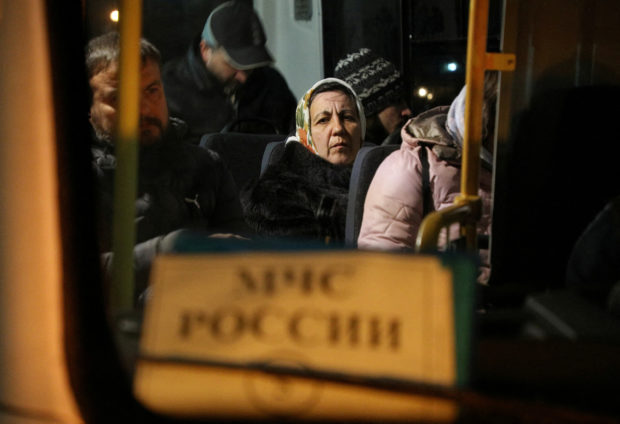Ukraine says Russians will take at least a week to leave Kherson city

Civilians evacuated from the Russian-controlled part of Kherson region of Ukraine sit inside a bus as they arrive at a local railway station in the town of Dzhankoi, Crimea November 10, 2022. (REUTERS)
KYIV/FRONTLINE NORTH OF KHERSON, Ukraine – Ukrainian troops pushed towards the southern strategic river port of Kherson after Moscow ordered one of the war’s biggest retreats, although officials fear Russian troops could still turn Kherson into a “city of death” as they expect it will take at least a week to withdraw.
Ukraine’s Defence Minister Oleksii Reznikov told Reuters in an interview on Thursday that Russia had a contingent of 40,000 troops in Kherson region and intelligence showed its forces remained inside the city, around the city and on the west bank of the wide Dnipro River.
“It’s not that easy to withdraw these troops from Kherson in one day or two days. As a minimum, (it will take) one week,” Reznikov said.
A pullout in Kherson would free up forces from both sides to fight elsewhere. The Russian army under General Sergei Surovikin appeared to have become more disciplined and brutal since his appointment as the new commander of Russia’s invasion forces in October, Reznikov said.
Russia announced on Wednesday it would withdraw from the west bank of the Dnipro that includes Kherson city, the only regional capital Moscow has captured since invading Ukraine in February.
Article continues after this advertisementWestern military and diplomatic sources cautioned that the Russian military move did not mean all was said and done even if it were a major victory for Ukraine.
Article continues after this advertisement“It’s definitely a turning point, but it doesn’t mean that Russia has lost or that Ukraine has won,” said Ben Barry, a senior fellow for land warfare at the International Institute for Strategic Studies in London. Russia was still capable of a new offensive or counterattacks.
“It is far too soon to write them off,” Barry said.
DE-MINING
Ukrainian forces have liberated 41 settlements as they advanced through the south, President Volodymyr Zelenskiy said in his Thursday evening video address.
Sappers and pyrotechnicians were going into areas retaken from Russian forces to rid them of thousands of unexploded landmines and ordnance they left behind, he said.
About 170,000 square kilometres (66,000 square miles) remained to be de-mined, Zelenskiy said, including in places where there was still fighting and “where the enemy will add landmines before its withdrawal, as is the case now with Kherson.”
The region’s Ukrainian-appointed governor, Yaroslav Yanushevych, writing on the Telegram messaging app, said Russian troops had “taken away public equipment, damaged power lines and wanted to leave a trap behind them”.
Mykhailo Podolyak, an adviser to Zelenskiy, said Russia wanted to turn Kherson into a “city of death”, mining everything from apartments to sewers and planning to shell the city from the other side of the river.
Russia denies it attacks civilians despite bombarding residential areas throughout the conflict. It has evacuated thousands of civilians from the Kherson area.
FIRST NIGHT OF SILENCE
A small group of Ukrainian soldiers was shown on Ukraine’s state TV being greeted by joyous residents in the centre of the village of Snihurivka, around 55 km (35 miles) north of Kherson city, with a Ukrainian flag fluttering above the square behind them. Reuters verified the location of the video.
A few kilometres away, in a devastated frontline village reached by Reuters in an area already held by Ukrainian forces, the guns had fallen silent for what residents said was the first quiet night since the war began.
“We hope the silence means the Russians are leaving,” said Nadiia Nizarenko, 85. The Russians could be preparing a trap, said Nizarenko’s daughter, Svitlana Lischeniuk, 63.
Still, there was joy. Petro Lupan, a volunteer distributing bread to residents, said he could not find words to express his feelings after he learned of the recapture of Snihurivka.
If Russia implements its withdrawal from an area that President Vladimir Putin proclaimed annexed a month ago, it would be its biggest retreat since its forces were driven back from the outskirts of Kyiv in March and a clear shift in the momentum of the nine-month-old war.
In the southeastern city of Zaporizhzhia, 54-year-old Larysa, who had recently fled Kherson to reach Ukrainian-held territory, said she could not reach family in the area.
“We tried contacting them … but there was no connection. We don’t even know … the fate of our relatives.”
“We’ve lived in the occupied territories for eight months. The situation there is difficult, especially psychologically. Our village is full of armed Russian soldiers … It is a miracle that we got out … There were tears of happiness when I saw our Ukrainian flag and our soldiers.”
Russian state media and pro-Kremlin war hawks defended the withdrawal from Kherson as a necessary move while acknowledging a heavy blow.
The retreat would leave Moscow with only limited gains to show for a “special military operation” that made it a pariah in the West and, according to a U.S. estimate, has killed or wounded some 100,000 Russian soldiers.
Russian forces are still holding on to other gains in the south, including a vital land route connecting Russia to the Crimea peninsula it seized in 2014, and cities in the east that they mostly obliterated while capturing them.